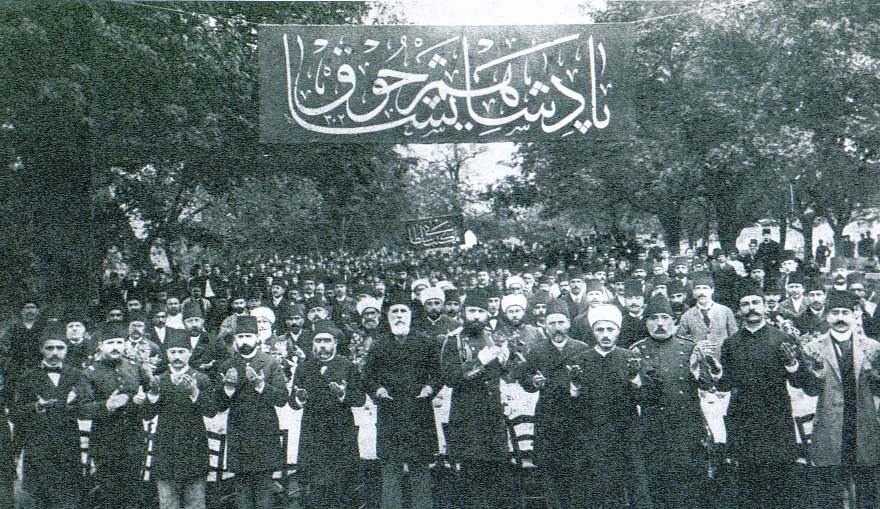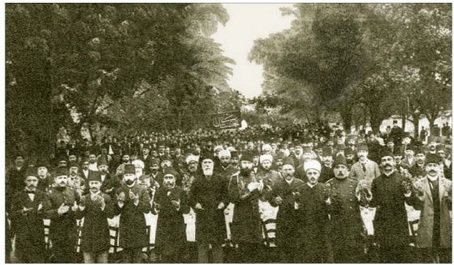
SUMMER HAS COME, LET'S GO ON AN EXCURSION...
As the holidays approach, schools are going on field trips one by one. This is an old tradition. In the past, the excursion of schools at the beginning of summer was a different world...
In the past, at the beginning of summer, each school would go to a nearby picnic area. Everyone eagerly awaited that day. When the day came, children would go to the picnic area in ox carts covered with tents, decorated with laurel branches, and furnished with cushions and pillows inside. Fires were lit at the destination, and meat pilafs, almond and milk halvas were cooked in large cauldrons and fed to the children; they were also offered to the guests there.

Excursion Day, Feast Day
Two days before the excursion, children would be informed; on the day of the excursion, they were instructed not to bring their reading bags and lunch boxes. On the day of the excursion, children would wear their best clothes, put on caps, and wave flags in their hands. These two were almost mandatory. In Istanbul, excursions held in Çırpıcı and Veliefendi meadows, and Beykoz meadow were very pleasant. Parents, relatives, and acquaintances of the children also participated in these picnics. At the picnic area, teachers sat in one place, school staff in another, and children in another. After eating, the children would fly kites and play other games.
There were players who entertained the public and the children by playing drums and zurna in front of the ox carts and performing various antics. They would paint their faces, wear strange hats, and play various games in multicolored trousers and shirts, passing in front of the people who filled the streets. One would wear a robe and a turban and take on the role of Istanbul Effendi (mayor); he would tease the shopkeepers along the way, making various jokes. One of the young men from the neighborhood would dress as a madman, making people laugh along the way. People watched this excursion parade with pleasure. On the way back from the excursion, they would return along the same path, this time with prayers and hymns.
Kapama Waqfs
Some schools had kapama waqfs (closing foundations) established for this purpose. These were called kapama (closing) because the excursions were mostly held close to holiday times. Just before the closing season, clothes and shoes were distributed to poor students with the money from these waqfs. The expenses of the excursions were also covered from here. In fact, there were merchants selling such items on the road from Kapalıçarşı to Yağlıkçılar. In schools without such a waqf, the expenses of the excursions were covered by the wealthy of the neighborhood in turn.
It wasn't just primary schools, but also middle, high school, and even college-level schools that had such excursions. The expenses for these students' excursions were covered by the sultan. During the reign of Sultan Abdulhamid II, it became a tradition to give lamb roast feasts to all students in Kağıthane every year. When spring came and the surroundings turned green, all students from the age of 7 to 20 would start wondering when they would go to Kağıthane for lamb roasting. The topic of the imperial feast was always discussed in school yards.
Not Just Primary School Students?
These feasts were also attended by students from the Military Academy, Kuleli Military High School, Imperial School of Engineering, Civil Engineering Faculty, Medical School, Political Science Faculty, Galatasaray High School, Veterinary and Pharmacy Schools, and even Saint Joseph School.
Each school would take turns attending the feast. One or a few would go together. For example, Veterinary School students would go together with Engineering and Civil Engineering students. The others eagerly awaited their turn. On the day of the feast, the students would wear their newest clothes and put on their white gloves. They would wake up at dawn with the sound of the bugle, board the special ferry waiting on the Eyüp coast in an orderly manner with the band in front and students behind.
After disembarking at the Kağıthane coast, they would reach the picnic area by walking or in horse-drawn carriages. Their navy blue uniforms and red fezzes would be covered in dust, but no one cared. The picnic area would be decorated with flags. Exercises would be performed on gymnastic equipment like horizontal bars, trapezes, and rings set up in the middle. Then, with the sound of the bugle, they would sit at the tables.
Roasted Lamb and Pilaf
Tables were set up with square, round, and oval tables. The tables would be ready with roasted lambs like pomegranates on top of pilaf platters, waiting for the students. There were also large lemonade jugs with taps on one side. Those who were overheated would attack the lemonade. The tables for officers and officials would be more carefully decorated. After these elegant feasts, served by palace staff, prayers were collectively offered to the sultan.
After rising from the tables, everyone would read poems and odes as a sign of gratitude. In fact, at the 1894 feast, the ode by Kabataşlı Mehmed Ali Efendi from the military school, ending with "I am a soldier, the son of a soldier; I am entirely loyal with a pure heart," was very much appreciated; the student was rewarded and the poet Hashim Bey was also given a medal.
Each school would stage some comedic sketches they had prepared in advance. Competitions like weightlifting, tug-of-war, and wrestling were held. Group games like hide and seek, hopscotch, and others were played in the field. The band would play; people would have fun; wrestlers would wrestle. Pointed hats were woven from the reeds by the riverbank and worn on heads.
If a problem arose during the competitions, it was immediately prevented. During the games, the school principal, officials, or even the pasha were sometimes tricked, lifted on shoulders, and carried, despite their cries of "Don't do it, my children." People would laugh and have fun all day long; then they would descend to the Eyüp coast again in an orderly manner and board the ferry. Exhausted, no one had the strength to eat dinner; they would immediately run to the dormitories and collapse onto their beds.
Önceki Yazılar
-
THE RUSH FOR GOLD14.01.2026
-
TRACES OF ISLAM IN CONSTANTINOPOLIS7.01.2026
-
WHO CAN FORGIVE THE KILLER?31.12.2025
-
WHEN WAS PROPHET ISA (JESUS) BORN?24.12.2025
-
IF SULTAN MEHMED II HE HAD CONQUERED ROME…17.12.2025
-
VIENNA NEVER FORGOT THE TURKS10.12.2025
-
THE FIRST UNIVERSITY IN THE WORLD WAS FOUNDED BY MUSLIMS3.12.2025
-
WHO BETRAYED PROPHET ISA (JESUS)?26.11.2025
-
IT HAS BEEN MORE THAN 100 YEARS SINCE ITS ABOLITION, BUT... IS THE CALIPHATE BEING REESTABLISHED?19.11.2025
-
GREETINGS TO YOU, O OTTOMAN SANJAK!…12.11.2025